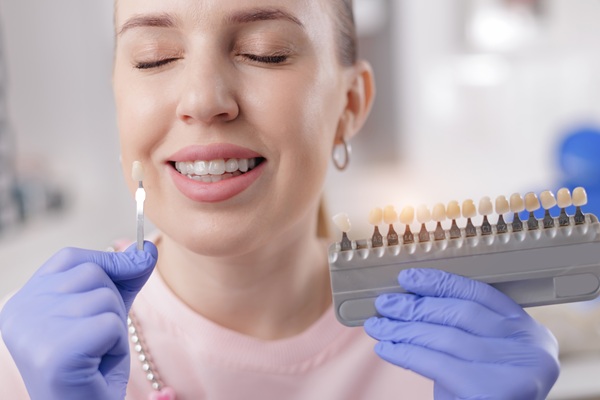What Are the Ways a TMJ Dentist Can Help You?

If you find yourself with TMJ, you need to head to a TMJ dentist immediately. TMJ, or temporomandibular joint dysfunction, is a serious condition of the jaw that can cause everything from pain and irritation to complete inability to move the jaw. This condition can grow more serious by the day, so if you are diagnosed with TMJ (also called lockjaw), you should endeavor to find a TMJ dentist that specializes in ways to treat the condition as soon as possible.
If treated quickly, it is possible to relieve symptoms and improve jaw movement without the need for more intrusive and painful procedures. A TMJ dentist will have several ways to fix your case of TMJ, depending on how severe the condition has become, your overall health, and other factors.
What are some causes of TMJ?
TMJ can come out of nowhere and cause a person to lose the ability to open or close their mouth properly. It may start as mild pain or discomfort when talking but can quickly escalate to problems with mobility in the jaw and severe pain.
Here are some of the causes of TMJ
Injury to the jaw
Though the jaw is meant to open and close easily and has considerable flexibility, an injury to the jaw, particularly a sudden impact, can cause the jaw to become misaligned or stuck in one position, which results in TMJ. Trying to move the jaw while in this condition will likely exacerbate the situation and cause the injury and the TMJ to worsen.
Certain illnesses
Another condition that can cause TMJ is illnesses that cause swelling and inflammation in the throat. This swelling can limit the range of movement of the jaw, and inflammation can quickly spread to the joint, causing difficulty and pain when opening or closing the mouth. In these cases, treating the illness may treat the TMJ, but if the illness persists for too long, the TMJ may become its own separate issue, needing different treatment.
Teeth clenching or grinding
The most common reason that TMJ occurs is due to tension in the muscles around the jawbone and joint. This tension is caused by pressure. Often excessive tension occurs when a person clenches their job during their sleep or grinds their teeth together during sleep, creating excessive force down on the jaw. Relieving the teeth clenching or grinding issue can sometimes alleviate TMJ symptoms, but other treatments may be necessary depending on the damage.
How can a TMJ dentist help?
Your dentist is trained to handle all areas of the mouth, including the jaw. That is why going to the dentist for TMJ treatment is the best idea in most cases. Your dentist can provide different solutions depending on how the TMJ was caused and your overall symptoms at the time.
Some examples of treatment include
Realignment of the jaw
If the jaw has been knocked out of alignment due to an injury or force, the easiest way to relieve symptoms is to realign the jawbone and make sure the joints are in the proper place. The patient can then take over-the-counter medications to manage any residual pain, and symptoms of TMJ should resolve quickly.
Botox injections
If the TMJ is caused by tightening of the muscles in the jaw, such as from a patient who is clenching or grinding their teeth, if treating the clenching and grinding issue does not resolve the TMJ, then another option that is commonly used is to inject Botox into the jaw at the joint. The effect of Botox will be to loosen the muscles around the joint and allow it to open or close like normal.
Oral surgery
Though it is typically reserved as a last resort, if the TMJ has reached a point where the patient can no longer open or close their mouth properly and other treatments have not resolved the issue, then the TMJ dentist may recommend oral surgery to surgically reposition the jaw or manipulate the muscles and tendons to release the locked jaw.
Discuss TMJ treatments
Having TMJ does not have to mean that you have to live with pain and limited mobility, but only if you head to the dentist as soon as possible. Depending on the cause of your TMJ, the TMJ dentist will have a way to relieve the symptoms and restore the motion of your jaw. In some cases, it is as simple as a dental appliance or an injection to get you feeling as good as new.
Request an appointment here: https://www.emersondental.com or call Emerson Dental Associates at (201) 620-9998 for an appointment in our Emerson office.
Check out what others are saying about our dental services on Yelp: TMJ Dentist in Emerson, NJ.
Recent Posts
Many people wonder when to call an emergency dentist for cuts, tears, or bites to the lips, cheeks, tongue, and gums. While these soft tissue injuries can look scary, prompt dental care can protect comfort, reduce infection risk, and save teeth. A general or family dentist who handles urgent cases can guide this care right…
Dental bonding is a minimally invasive way to enhance or repair the smile. Whether the issue is staining or a minor crack, bonding can be a quick and effective way to address it. Learning more about this common dental service can help you determine whether it is the best option for restoring your smile. Dental bonding…
Dental veneers are among the most popular cosmetic treatments in modern dentistry. However, there are several misconceptions about their purpose, durability, and required maintenance. If you are considering dental veneers to improve your smile, it can be helpful to understand the myths and facts about this cosmetic treatment.A common misconception is that dental veneers always…
A restorative dentist focuses on diagnosing and treating dental problems that affect the function and appearance of the teeth. While general dentistry emphasizes prevention and maintenance, a restorative dentist provides solutions for damaged, decayed, or missing teeth. These services are essential for patients seeking to regain comfort, oral function, and confidence in their smiles. Our…


